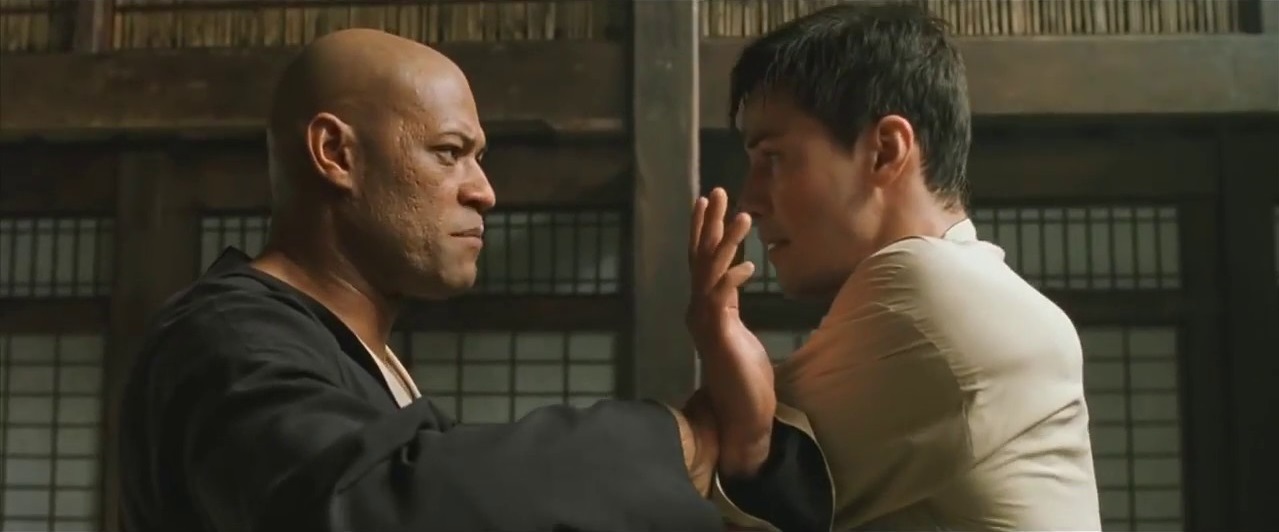
This post is the first part of a talk I gave to 10 groups at Y Combinator to strengthen the bonds between the co-founders. The second part will be a little later .
Everyone is in conflict. Your task is to learn how to conflict correctly
Feeling an increase in tension between you and your co-founder is a normal, healthy, and expected situation. You should expect that you will have to clash with your co-founder at some point, as your perspectives and personalities will inevitably clash when starting a startup. At any time, there can be disputes between co-founders about the distribution of shares, roles and responsibilities, strategies for hiring and product development, mutual productivity - or all at once!
Conflict can be good or bad, and no one from birth knows how to do it right. The lack of reasonable methods for resolving conflicts suggests that either we tend to completely avoid conflict situations, or we repeat the same problematic behavior over and over again, not realizing that there is another way of interaction - more effective for both us and the partner. Communicating productively, respectfully, and honestly about complex topics is a skill that comes from practice and experience. Your job (as a startup founder) is to learn how to conflict correctly.
My first piece of advice to founders who are learning to conflict is that you must be aware of exactly how you conflict (I call this "the style you practice"). Use this knowledge to change your behavior in order to balance the dynamics in your team. This way you can reduce the emotional tensions inherent in founding teams and make internal conflicts healthier.
Tip 1: get to know yourself (and the style you practice)
Many of us know that under stress our sleep and diet deteriorate, and we also begin to cope much worse with routine tasks. But do you know how your behavior, thoughts and emotions change towards co-founders when things are not going well?
Startups are often messy, confusing, chaotic and complex, and can lead to loneliness and sadness - and sometimes all within 5 minutes. As a founder, you will often have to operate under stressful conditions that will deviate your behavior 99% of the time. The more you know about how you deal with those around you under stress, the better you can handle yourself during inevitable conflicts, and the sooner you can get back to work on your company.
Fortunately, the results of the work of research psychologists over the past few decades have made this task easier. It turns out that most people in stressful conditions behave predictably and consistently (the same style that we talked about earlier) (1).
To simplify even more, I note that most of the co-founders adhere to one of two (only two!) Styles: anxious and escapist.
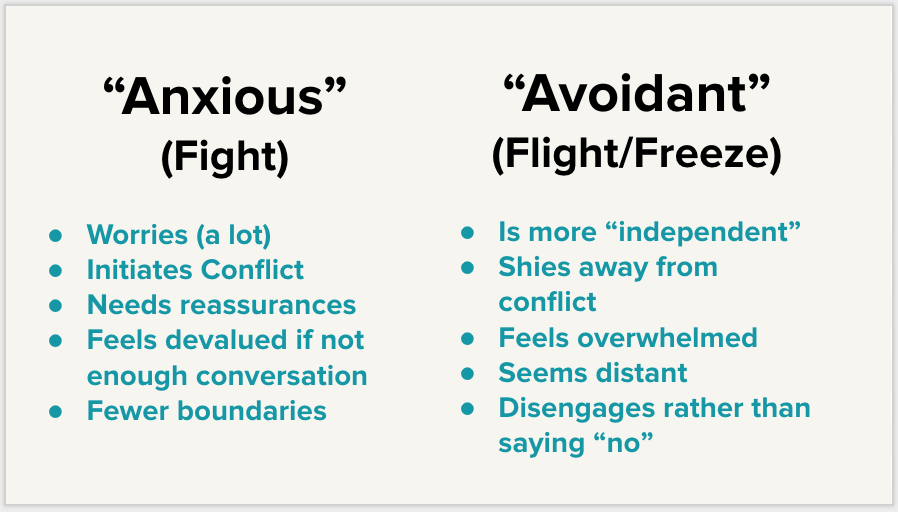
Before I go into more detail on these styles, I want you to know that none of them are right or wrong. These two categories simply describe the stressful behavior of most startup founders. Moreover, these styles are directly opposite, which means that you (and your partners) can be completely described by one of them, or you can have features from both styles. So, for example, you may show anxiety when communicating with a co-founder and escapist when communicating with a romantic partner (or vice versa). In this text, the styles will be described as exactly the opposite, although as a rule in life they are quite dynamic and flexible, since they largely depend on what style our partners adhere to and what they take from us in relationships.
Co-founder with an anxious style
The anxious co-founder seeks to exude his energy and emotions under stress. The nervous system of such people is overloaded. The anxious style is the physiological equivalent of a "combat" reaction, as if the whole body, cell by cell, is mobilized to wage war. It is important to note that such people seek help from others to help them calm down, although this search for calmness is often hidden behind criticism from the outside, small directions and / or disappointment.
- An anxious co-founder is going through difficult times very much, and in stressful situations everyone will notice it.
- , ( ). .
- , - ( ). , . - , « » , - .
- , , , , .
- , - , (!)
- , , . , - , , Slack, SMS, – - ( ).
- , , , , .
- , , / .
- - , , , , .
,
A co-founder who adheres to an avoidant style behaves exactly the opposite and shows little emotion. While anxious co-founders unleash their energies under stressful conditions, avoiding co-founders retreat - as if their nervous systems were off. This style is the relative equivalent of physiological flight or freezing reactions. In stressful environments, avoidant co-founders shut in and seek comfort on their own. Such a need for complacency is often perceived as detachment, coldness of character, or indifference.
- Avoiding co-founders are considered more "independent". They "hold everything in their hands." They tend to concentrate on solving problems. They prefer to get to work, rather than discussing details and thinking carefully about a strategy.
- ( , , - - ).
- , «» ( , ).
- , .
- . , – , .
- , , . (2)
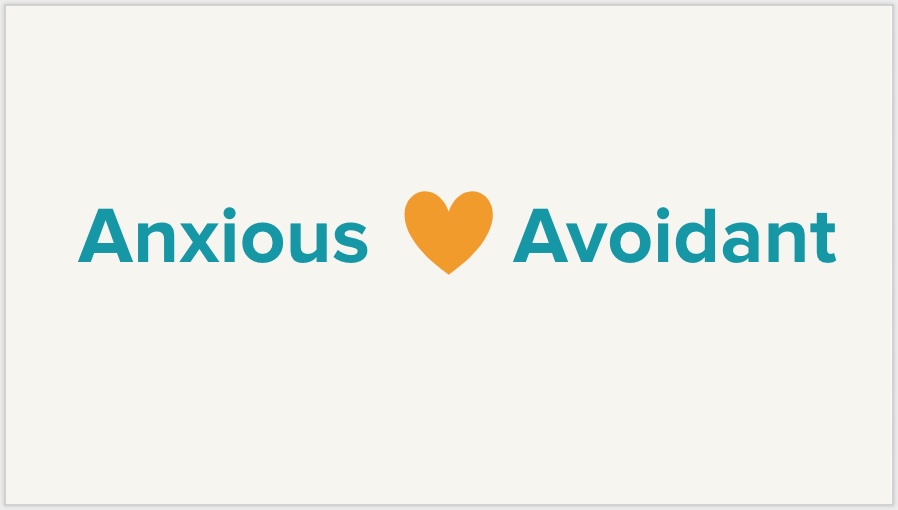
Anxious and conflict-averse co-founders are almost magnetically attracted to each other. Situations and conditions with severe pressure (similar to those that occur during YC sessions) also lead to the emergence of such dynamics, even in teams that did not previously have it. When forming a team of three, two are often separated by anxiety / avoidance tendencies, and the third acts as an intermediary between them.
The dynamics of anxiety and avoidance are a potential storm that can create eternal conflict if not dealt with. The fact is that this is an endless cycle in which one co-founder constantly needs something (communication, reassurance, confidence) from his partner, and he, in turn, becomes more and more distant and does not provide this support (because such conditions suppress and repulse him even more).
These dynamics continually generate negative emotions, and as the needs of the parties remain unmet, the tension builds up. As negativity builds up, less attention, time, and energy are given to the startup - it is directed towards relationships, and because of this, the cofounder team (and therefore the company) is likely to die.
Getting stuck in this dynamic is a dead loop for budding teams, because much of a startup's potential depends on the team members themselves.
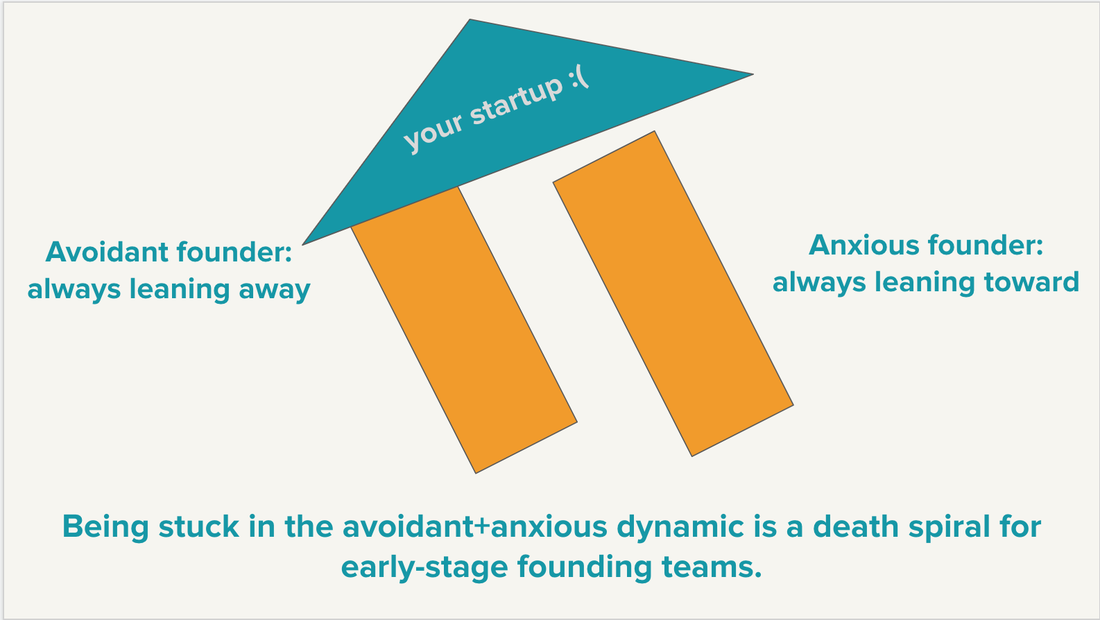
To achieve balance in a co-founder team, each member must take steps to smooth out the extremes of their nature. It will also allow their partners to relax and move beyond their behavior. The ultimate goal is to balance the anxiety / escapism in the team, to find balance and agreement in order to conduct healthy and clear negotiations instead of unhealthy, energy-intensive and endless fights.
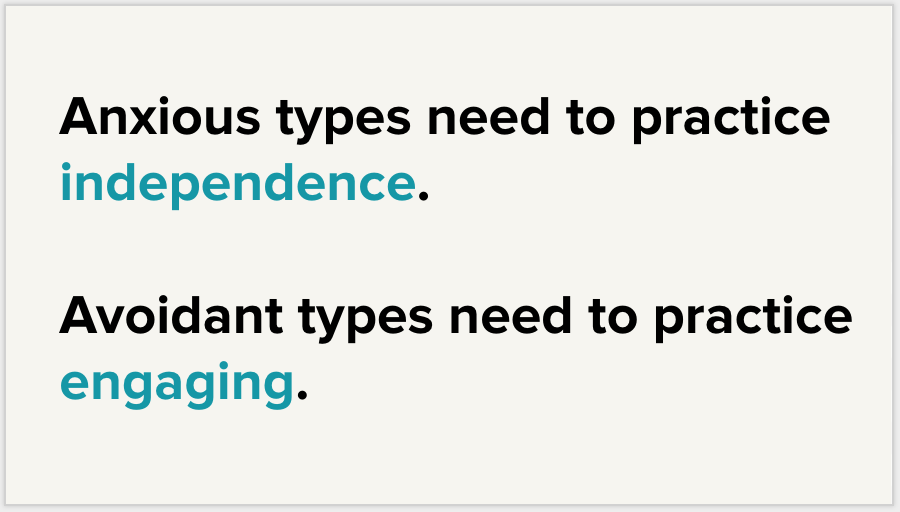
To find this balance, anxious co-founders must be able to exercise independence . To do this, you can try the following:
- Think about how to solve problems yourself
- Try to actively listen to your interlocutors instead of pushing them
- Communicate with outsiders (close friends, partners, doctor, and so on - NOT employees or investors)
- Learn to express resentment and oppression from the co-founders (do not bring your anger and criticism)
- Learn to be patient and attentive while waiting for a response from partners (learn to calm yourself and restrain your feelings)
- Give your partners time and space to respond
- Let your partners take a step towards you or initiate a conflict, stop constantly pulling it
To contribute to achieving balance, avoiding co-founders need to learn to be involved . To do this, there are the following measures:
- Let your partners know that you are not indifferent to them / the startup / project / task
- «»
- 3 (, – ) ,
–

When the anxious co-founder learns independence and lessens his own need for comfort from partners, it will be easier for the avoidant to take the initiative (oddly enough, the needs of anxious co-founders are more often met when these people can be independent). Avoiding confrontation will reduce the amount of emotion that drains the co-founders. Finding a balance will allow for healthy and productive conversations about actually building a business.
The more you know about your own behavior (and the style of your partners), the easier it will be for you to identify your own unproductive behavior and take action.
It takes time to learn how to achieve this balance. The next great step is to share this post with your co-founder and tell him about the style you follow.
- What situations in the past might have exposed your extremes?
- What do you value about other people's styles and what drives you crazy?
- Can you use this text to learn another (better) way to deal with potential conflicts (assuming they will happen)?
- What would be the “ideal” conflict for each of you?
- Can you gently hold each other accountable for your natural qualities in future conflicts?
To be continued
If you want to help with translations of useful materials from the YC library - write in a personal, @jethacker cart or mail alexey.stacenko@gmail.com
Follow the YC Startup Library news in Russian in the telegram channel or on Facebook .